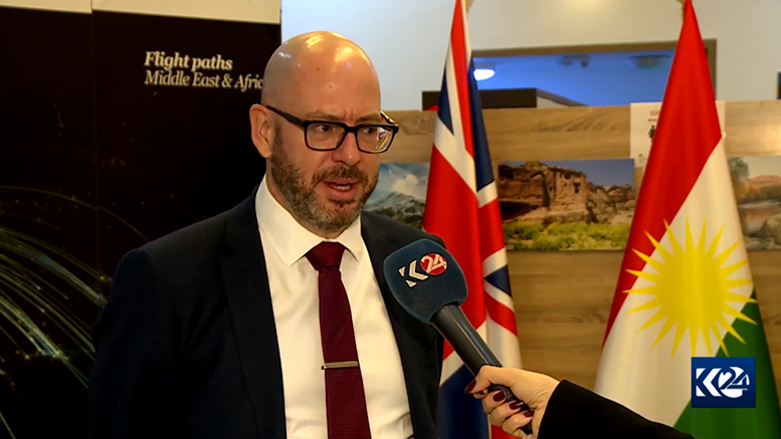UK working with Iraqi government and KRG to improve lives of religious minorities: Consul General
"The freedom to practice any Religion or Belief, without fear of consequence, is a vital foundation for building a stable and prosperous society," he said.

ERBIL (Kurdistan 24) – The United Kingdom Consul General to Erbil David Hunt recently visited the Yezidi holy temple in Lalish in Shekhan to meet the Yezidi leadership.
It was a privilege to meet #Yezidi Spiritual Leader, the Baba Sheikh and #Yezidi Prince, Mir Hazim last week at #Lalish, and hear about issues the #Yezidi community in Iraq continue to face. The #UK reiterated its commitment to support all Iraq’s religious minorities #FoRB. pic.twitter.com/jVhqxamVQC
— David Hunt (@DavidHuntFCDO) March 14, 2022
"The visit was organized to coincide with International Women's day," Hunt told Kurdistan 24. "The UK Government's view is that Women's rights are human rights, enshrined in conventions that we support strongly. The Women, Peace and Security agenda is integral to our human rights strategy and approach in Iraq."
"My visit underlined that message," he said. "For example, I participated in a roundtable with women survivors and minority representatives of the ISIS atrocities to hear their experience and offer UK support. I also wanted to demonstrate the UK's commitment for freedom of religion and Belief (FoRB)."
Hunt explained that protecting and promoting FoRB is one of the "most pressing issues of our generation."
"The freedom to practice any Religion or Belief, without fear of consequence, is a vital foundation for building a stable and prosperous society," he said.
Supporting religious minorities
Hunt also added that the UK is working with the Government of Iraq and the Kurdistan Regional Government (KRG) to promote FoRB and to improve the lives of religious minorities.
Read More: UK 'committed partner' of KRG, envoy says
"So far, we have contributed £31m to the UN Development Programme: Funding Facility for Stabilisation, which works to restore vital services across areas of Iraq that have been liberated from Daesh (ISIS), with 72 out of 87 projects implemented in the historically Yazidi areas of Sinjar and Sinuni, including the rehabilitation of 23 schools, and three primary healthcare centers," he said.
"More widely, the UK has committed £272m in humanitarian support to Iraq since 2014, providing a vital lifeline of emergency food, shelter, medical care, and clean water to the most vulnerable in the country, including those who have been displaced from their homes, many of whom are Yazidis and Christians," he added.
Protecting the cultural heritage of religious minorities is another crucial element of the UK's approach to protecting the freedom to practice any Religion or Belief, Hunt explained.
"With financial support from the UK's Cultural Protection Fund, the British Council has delivered multiple projects to preserve the identity of different religious minority communities, including a partnership with Oxford University, the AMAR Foundation, and the Yazidi Spiritual Council to record and document over 100 sacred songs from the Yazidi community, and the establishment of a Yazidi women's choir," he said.
He added that cultural heritage and identity have also featured prominently in the British Council's TAHAWER program, a youth-led dialogue and debate initiative that explores the relationship between religion.
"Local customs and peace building, involving young people from all of Iraq's different communities including religious minorities such as Christians, Yazidis, Shabaks and Yarsanis," he said.
Preventing Sexual Violence
Hunt underlined that Iraq is also a priority country for the UK on Preventing Sexual Violence in Conflict.
"The UK has been leading efforts to support the implementation of the Yazidi Survivors Law," he said. "We are currently funding IOM to help build the capacity of the Directorate of Yazidi Survivor Affairs to provide necessary reparations for survivors from Christian, Yazidi, Shabak and Turkmen communities."
"We are also funding Yazda to deliver provisions for psycho-social support for female Yazidi survivors of conflict-related sexual violence," he added. "We recognize the need for accountability and justice for Daesh crimes for survivors. We continue to support the United Nations Investigative Team to Promote Accountability for Crimes Committed by Da'esh (ISIS) to deliver meaningful accountability."
Hunt explained that the UK recently launched a program to advance the women, peace, and security agenda in Iraq.
"Over the lifetime of this project, we expect to disburse more than £2 million worth of grants to support grassroots women-led organizations, many of whom work directly with minority religious groups, including Yezidis, to support their engagement in local and national dialogues and meet a range of community needs," he said.
Since its inception, the UK has also supported the UN Investigative Team to Promote Accountability for Crimes Committed by Da'esh, ISIS (UNITAD).
Read More: UNITAD begins unearthing 7 mass graves in Sinjar
"We continue to work with UNITAD to advance mechanisms to hold Da'esh (ISIS) to account for their atrocities, including against the Yezidi population in Iraq," Hunt said.
Sinjar Agreement
He also underlined that "the UK supports the implementation of the Sinjar Agreement."
"Implementation would present a step towards achieving stability and reconstruction of the district to facilitate the return of displaced families to their homes," he said.
The Sinjar Agreement, reached between the federal government of Baghdad and the Kurdistan Regional Government (KRG) in October 2020, calls for the removal of all armed groups that operate in the embattled district.
Read More: KRG and Baghdad reach administrative, security agreement on Sinjar
A new report of the official US Commission on International Religious Freedom (USCIRF) recently said that the Sinjar Agreement remains unimplemented.
Read More: USCIRF report underlines Sinjar Agreement remains unimplemented
On Feb. 21, Hans Akerboom, the Dutch Consul General in Erbil, also visited the Yezidi holy temple in Lalish. During that meeting, Yezidi leaders emphasized the importance of implementing the Sinjar Agreement.